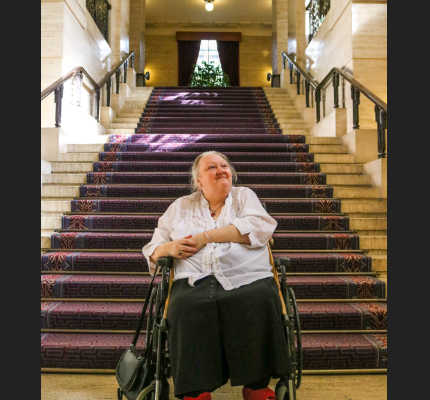The Body

Object of shame or instrument of freedom?
Like others, I admire conventionally healthy, beautiful bodies. I am not a fan of stick-thin figures but there are those who are. There are those who find short, fat bodies like mine repulsive but, thankfully, there are others who do not. I am also physically disabled and have several chronic illnesses. For some this makes my presence distasteful or difficult to cope with; yet there are those who see me as a person first and recognise my disability afterwards, and they are comfortable with my company. Reactions to the bodies of others are as diverse and perverse as our reactions to our own bodies. Our human bodies are amazing and miraculous, so why are we so easily made to feel ashamed of them?
I would like to change my body, to weigh less, to be healthier, to be able-bodied, but have neither strong willpower nor a magic wand to achieve these things. This being so, I concentrate on the positives in my life, on what I can do rather than what I cannot do, on what I like about myself, not on things I don’t like. I look around me and see my friends and my family and count my blessings; without them I would be housebound and very lonely. To them I am a person, not an ailing body, I love and am loved for myself and so I have joy in my life.
I am pained by the current obsession in the West with youth, beauty and thinness, demoralising – even destroying, those who cannot achieve the look that they see on every magazine cover and billboard. Children as young as five are bullied for being overweight or ugly when they are neither, and they internalise a negative self-image that can have life-long implications for them. Our collective self-confidence is becoming image-driven and people are suffering because of it, even to the point of self-mutilation and suicide. We feel appreciated for how we look, not how we act.
Our bodies were designed to enable us to be mobile, able to hunt and forage, able to build a shelter, have children and protect ourselves. As the majority of us no longer need to do most of those things, we have come to judge our bodies, not on what our bodies do but on how they look and on the opinion of others. Strangely this has led to the opposite disorders of obesity and anorexia – both of which can kill.
It is ironic that whilst Western populations, attempting to be thin, spend millions of pounds on exercise machines, diet foods, slimming pills, and even cosmetic surgery, the populace of many other countries cannot even find the means to eat enough to stave off starvation and death. In the faces and bodies of size zero fashion models, there are frightening similarities to the gaunt images that stare at us, hauntingly, on news programmes about areas of drought and misery.
It is time we began to appreciate the wonderful bodies we have been gifted, to enjoy them and look after them. We must value what a person contributes, not just how they look. At the same time, we must try to improve the health and welfare of those around our world whose bodies are starved, diseased and destroyed. We are dying of privilege while they are dying of poverty. This must change so that all of our bodies can be healthy and productive instruments of freedom.

